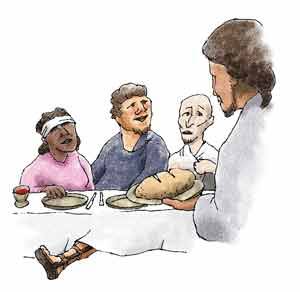Banquet Wisdom
Banquet scenes are frequent in the Bible. Jesus used meals shared with all kinds of persons as occasions to impart his wise teachings and as symbols for life in the coming kingdom of God. Banquets are especially prominent in Luke’s Gospel, and most of Luke 14 presents Jesus’ teachings in the context of a meal at the house of a leading Pharisee.
The two teachings in today’s reading belong to the category of wisdom teachings about God’s kingdom. By all accounts Jesus was a wisdom teacher. But his wisdom can be properly appreciated only when it is placed in the context of his central theme: the kingdom of God.
Jesus’ first wise teaching looks like shrewd and even calculating behavior at a wedding banquet. If you are only a distant relative or friend of the bride or groom, you should not seat yourself at the head table. The chances are that someone will come by and inform you that you belong at the back of the hall. How embarrassing it will be for you to have to move to the back of the hall in front of all the other guests! A wiser strategy would be to seat yourself first at the back. Then if by chance you are summoned to the head table, all the other guests will see you and conclude that you must be very important indeed.
On the surface this advice may appear to be practical wisdom, something especially significant in an honor-shame society. On the theological level, however, it is Jesus’ reminder that the banquet in God’s kingdom is not for the rich and powerful only. Rather, it is especially for the humble, for those who recognize that in comparison with God we all are poor and insignificant. Jesus promises that such persons will be exalted.
Jesus’ second teaching is about who should be invited to your house for dinner. On the surface, it may not seem very wise at all. Jesus tells his host (“a leading Pharisee”) to invite marginal persons (“the poor, the crippled, the lame, the blind”) to his house. Recall that the Pharisees were the great Jewish proponents of the doctrine of the general resurrection and of rewards and punishments after death. Jesus agreed with the Pharisees on these matters.
According to most practical human wisdom, it would be wiser to invite to your house those who might be able to benefit you in the future. This policy, of course, is enlightened self-interest, and it seems to make the world go around. By suggesting that the leading Pharisee should invite those who could not benefit him at all (at least in this life), Jesus challenges the Pharisee (and us) to examine why we do what we do and what we really believe about life after death. Do we do good deeds to get a good reputation or to benefit materially or achieve some other immediate goal? Or do we believe enough in the resurrection and the divine judgment to leave the rewards for our good deeds to the justice and mercy of God?
This article also appeared in print, under the headline “Banquet Wisdom,” in the August 27, 2007, issue.








